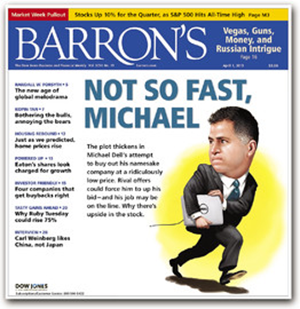|

Follow Up
Michael Dell’s $6
Billion Holdup
A judge recently ruled
that Michael Dell and Silver Lake underpaid Dell shareholders by $6
billion.
June 11, 2016
A Delaware judge’s recent ruling that
Michael Dell and Silver Lake Partners shortchanged public shareholders
in the $25 billion leveraged buyout of Dell in 2013 vindicates the
many critics of that dubious transaction, including Barron’s.
Travis Laster, a Delaware chancery court
judge, ruled that the fair value for Dell, the PC, software, and
services provider, was $17.62 a share, rather than the price of $13.75
paid to shareholders by Michael Dell and his buyout partner, Silver
Lake. That means public shareholders were shortchanged by $6 billion.
But Dell and Silver Lake will pony up only a fraction of that
amount—some $25 million plus $17 million in interest—because fewer
than 1% of Dell shareholders participated in the arduous appraisal
process that led to the ruling.
T. Rowe Price Group (ticker: TROW), a
holder of 31 million Dell shares and a chief critic of the deal, was
ruled ineligible to benefit from the appraisal ruling because it
mistakenly voted in favor of the merger. (For the back story on that,
see
Fund of
Information.) T. Rowe will compensate fund shareholders for
the error to the tune of $194 million.
Dell was taken private after a highly
contentious nine-month battle during which numerous large
shareholders, including billionaire activist Carl Icahn and
Southeastern Asset Management, argued that Michael Dell had taken
advantage of Wall Street’s pessimism about the PC market to
significantly underpay for the company. Facing strong opposition and a
likely defeat in a shareholder vote, Michael Dell got the Dell board
to make a key change in the voting rules in return for a token
increase in the deal price, allowing his lowball offer to prevail.
Barron’s
wrote many critical articles about the LBO drama, including a cover
story (“Not
So Fast, Michael,” April 1, 2013) in which we argued that
Dell and Silver Lake were trying to steal the cash-rich company and
that Dell’s real motivation was greed rather than a stated need to
reposition the company outside the glare of public ownership.
In a well-reasoned 114-page decision,
Judge Laster made a distinction between the price paid by Dell and
Silver Lake, which was based on LBO (leveraged buyout) models that aim
to produce multiyear returns of at least 20% to the buyers rather than
fair value. In other words, the price was what the buyers wanted to
pay, not what the company was worth.
The judge noted that the special
committee of Dell’s board that oversaw the sales process never focused
on conventional valuation methods, such as discounted cash flow or
book value, but looked simply at the deal price relative to
then-depressed Dell share price.
Dell’s financial performance since the
deal appears to support our view that Michael Dell and Silver Lake
stole the company. Based on limited public financial reporting, Dell
has generated significant cash from operations and paid down debt
despite the challenges in the PC business.
Net debt was down to $8 billion on Oct.
31, 2015, from $11 billion on Jan. 31, 2014. And that’s before the $3
billion sale of an information-services business and an IPO of a
software business worth $1 billion. Adjusted pretax cash flow—earnings
before interest, taxes, depreciation, and amortization—was $659
million in the most recent quarter, up 28% from a year earlier.
Dell’s success since the LBO probably
means that Michael Dell and Silver Lake have earned a multiple of
their equity investment. It also has enabled Dell to reach a $63
billion deal to buy the larger EMC (EMC), a transaction that appears
on track to close this summer. Within a few years, Dell likely will be
public again and it then should be apparent just how lucrative the LBO
really was.
—Andrew Bary
|

